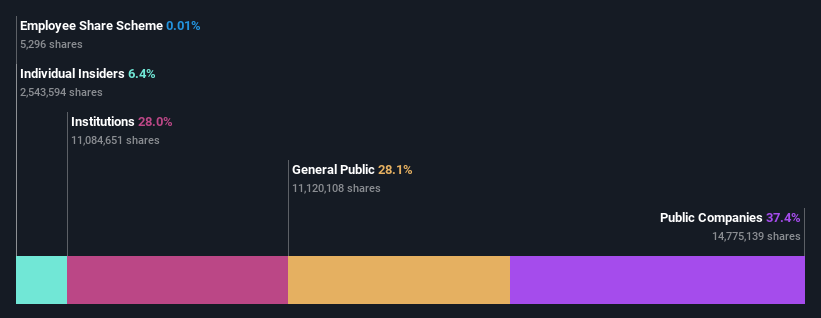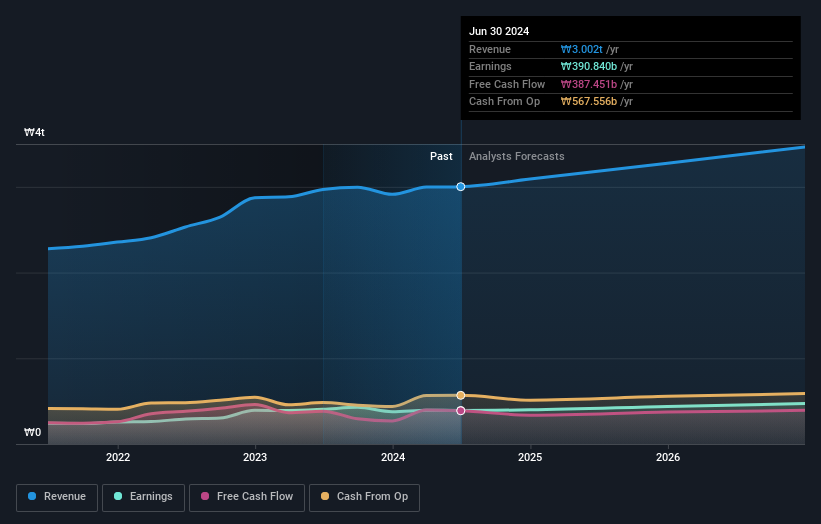- South Korea
- /
- Food
- /
- KOSE:A271560
ORION Corp.'s (KRX:271560) largest shareholders are public companies with 37% ownership, individual investors own 28%

Key Insights
- ORION's significant public companies ownership suggests that the key decisions are influenced by shareholders from the larger public
- 52% of the business is held by the top 3 shareholders
- Institutions own 28% of ORION
If you want to know who really controls ORION Corp. (KRX:271560), then you'll have to look at the makeup of its share registry. The group holding the most number of shares in the company, around 37% to be precise, is public companies. Put another way, the group faces the maximum upside potential (or downside risk).
Individual investors, on the other hand, account for 28% of the company's stockholders.
Let's delve deeper into each type of owner of ORION, beginning with the chart below.
View our latest analysis for ORION

What Does The Institutional Ownership Tell Us About ORION?
Institutional investors commonly compare their own returns to the returns of a commonly followed index. So they generally do consider buying larger companies that are included in the relevant benchmark index.
ORION already has institutions on the share registry. Indeed, they own a respectable stake in the company. This implies the analysts working for those institutions have looked at the stock and they like it. But just like anyone else, they could be wrong. If multiple institutions change their view on a stock at the same time, you could see the share price drop fast. It's therefore worth looking at ORION's earnings history below. Of course, the future is what really matters.

We note that hedge funds don't have a meaningful investment in ORION. Looking at our data, we can see that the largest shareholder is ORION Holdings Corp. with 37% of shares outstanding. In comparison, the second and third largest shareholders hold about 9.1% and 5.9% of the stock.
To make our study more interesting, we found that the top 3 shareholders have a majority ownership in the company, meaning that they are powerful enough to influence the decisions of the company.
While it makes sense to study institutional ownership data for a company, it also makes sense to study analyst sentiments to know which way the wind is blowing. Quite a few analysts cover the stock, so you could look into forecast growth quite easily.
Insider Ownership Of ORION
The definition of an insider can differ slightly between different countries, but members of the board of directors always count. Company management run the business, but the CEO will answer to the board, even if he or she is a member of it.
I generally consider insider ownership to be a good thing. However, on some occasions it makes it more difficult for other shareholders to hold the board accountable for decisions.
We can see that insiders own shares in ORION Corp.. The insiders have a meaningful stake worth ₩252b. Most would see this as a real positive. Most would say this shows alignment of interests between shareholders and the board. Still, it might be worth checking if those insiders have been selling.
General Public Ownership
The general public-- including retail investors -- own 28% stake in the company, and hence can't easily be ignored. This size of ownership, while considerable, may not be enough to change company policy if the decision is not in sync with other large shareholders.
Public Company Ownership
It appears to us that public companies own 37% of ORION. It's hard to say for sure but this suggests they have entwined business interests. This might be a strategic stake, so it's worth watching this space for changes in ownership.
Next Steps:
I find it very interesting to look at who exactly owns a company. But to truly gain insight, we need to consider other information, too. Consider for instance, the ever-present spectre of investment risk. We've identified 1 warning sign with ORION , and understanding them should be part of your investment process.
If you would prefer discover what analysts are predicting in terms of future growth, do not miss this free report on analyst forecasts.
NB: Figures in this article are calculated using data from the last twelve months, which refer to the 12-month period ending on the last date of the month the financial statement is dated. This may not be consistent with full year annual report figures.
New: AI Stock Screener & Alerts
Our new AI Stock Screener scans the market every day to uncover opportunities.
• Dividend Powerhouses (3%+ Yield)
• Undervalued Small Caps with Insider Buying
• High growth Tech and AI Companies
Or build your own from over 50 metrics.
Have feedback on this article? Concerned about the content? Get in touch with us directly. Alternatively, email editorial-team (at) simplywallst.com.
This article by Simply Wall St is general in nature. We provide commentary based on historical data and analyst forecasts only using an unbiased methodology and our articles are not intended to be financial advice. It does not constitute a recommendation to buy or sell any stock, and does not take account of your objectives, or your financial situation. We aim to bring you long-term focused analysis driven by fundamental data. Note that our analysis may not factor in the latest price-sensitive company announcements or qualitative material. Simply Wall St has no position in any stocks mentioned.
About KOSE:A271560
ORION
Engages in the manufacture and sale of various confectionery products in South Korea, China, and internationally.
Flawless balance sheet and good value.
Market Insights
Community Narratives




